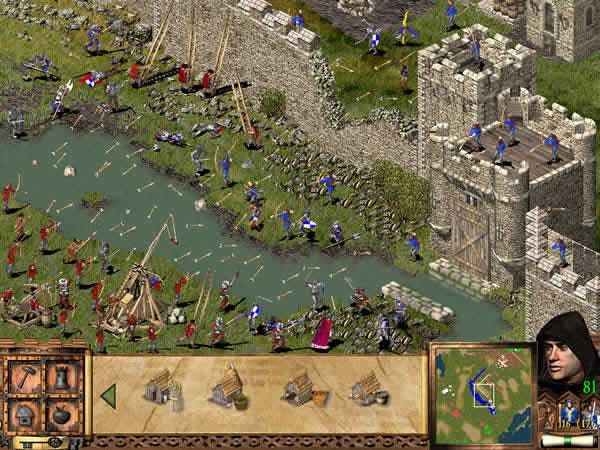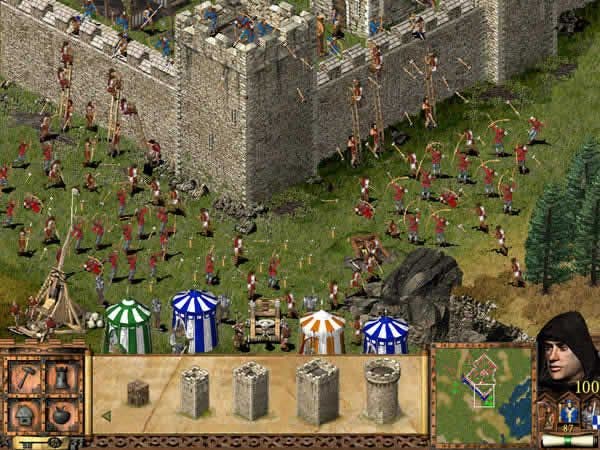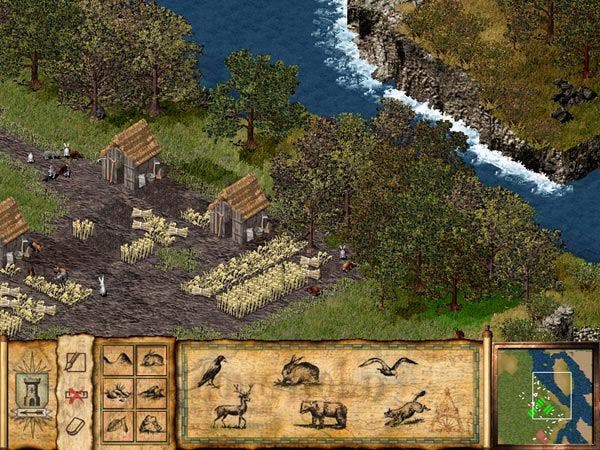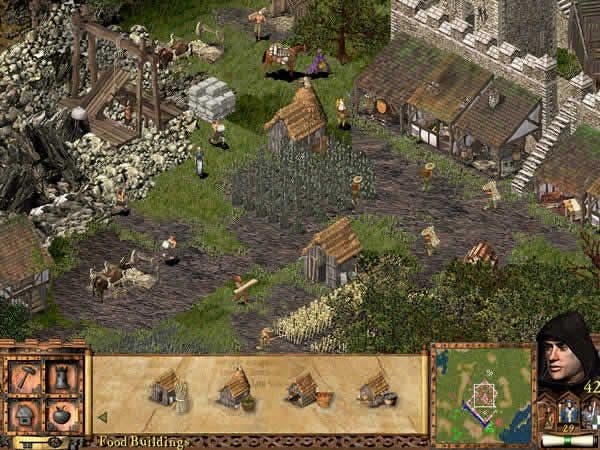Eric Ouellette of Firefly Studios
Interview - we talk to one of Firefly's co-founders about their new medieval castle strategy game, Stronghold
Two years ago a trio of developers with "a long standing desire to create a really good castle builder" left Impressions to form their own studio. During their time at the company they had worked on the Lord of the Realms strategy games and the popular Caesar series of city building sims, but now it was time for them to try something a little different.
"We thought that a medieval setting with a blend of strong builder and real time strategy elements would make a fantastic game. And so the idea for Stronghold was born. What we now have is a game that we have always wanted to make, which involves building, designing and besieging castles."
We spoke to co-founder and producer Eric Ouellette to find out more...

Castles
"Stronghold is a unique cross between a city builder such as Caesar III and a real-time strategy game like Age of Empires", Eric explains. "It incorporates much more building and community managing than a traditional RTS, yet allows for a more intense combat experience than city builders have featured in the past."
The focus of the game is very much on the castles themselves though, making Stronghold more like the classic Castles series than your typical real-time strategy title. "The design of the castle plays perhaps as big a part in the outcome of a siege as a player's ability to quickly manage their troops. We are going to give players full RTS-style control over all military units, but there will be no big open battles - the balance of troops will see to that. Instead the game plays around defending or attacking a castle."
"Our aim for combat is to have each unit in the game have very specific uses as well as strengths and weaknesses. We won't have tons of different types of unit, but players will have to concentrate on learning the strengths of each type in order to be successful. For example, the spearmen will be very weak in combat, but will dig moats for you and are good at pushing ladder men off the walls. Swordsmen are very slow, but deadly against archers. Engineers are expensive to buy, but are needed to man siege equipment such as trebuchets, catapults and boiling oil."

Boiling Oil?
Yes, this is the middle ages, and as such there will be plenty of gruesome weaponry for both attackers and defenders to use, including the obligatory cauldrons of boiling oil.
"We are incorporating a lot of warfare elements that were unique to the period, such as moats, tunneling, boiling oil, trebuchets and killing pits. We really want to bring out the flavor of what it was like to wage siege warfare in medieval times. We find the period fascinating. Previously we worked on The Lords Of The Realm series, [which was] set in the medieval period, and now with Stronghold we wanted to add a lot more detail to the siege aspect of the game. We researched everything in great detail, from the mechanics of a trebuchet down to what people ate. Most of the time being historically accurate doesn't clash with the game being fun. But if it does, fun wins!"
One thing which was deemed fun was to recreate a range of historical castles such as Windsor, Harlech, Glücksberg and Chateau du Coucy for players to fight over in the multiplayer mode. This international flavour also spills over into the single player campaign, which will vary slightly depending on where you live. "If you live in England you will be fighting to reunite England. If you live in France you will be fighting to reunite France. This won't actually change the missions you play, but we thought it would be a nice thing to do for players - they will fight a little harder if they feel like they are defending their own country. At the moment we are planning to support England, Germany, France, Italy and Spain."

Mr Popularity
Firefly weren't content with just covering a single historical period either, and the main campaign covers much of early medieval history, from the 11th to the 14th century. This "takes players through the evolution of castles from building wooden palisades to Norman keeps up through Edwardian killing machines".
New technologies will become available to you as you progress through the game, and the process of designing and building your castle has been made as flexible as possible. "Players can build walls of any thickness then add defensive crenulations. They have a choice of different gatehouses, towers and drawbridges, as well as the ability to add stairs. All of these interconnect and function together [in] a Lego-like system they can use to create their castle. Once the main castle is in place they can add moats, killing pits and pitch ditches, mount mangonels and ballistae on the towers, decorate it with flags and gardens..."
It's not all about building, defending and attacking castles though, because at its heart Stronghold is a sim. "The player doesn't have to micro-manage resource gathering or continually click to produce troops, these all happen automatically for them. Instead they must balance their overall economy, setting rations and tax levels. The main variable in managing the castle economy is popularity, [which] determines how many people will come and work at your castle. If your popularity falls too low people will leave your lands to find work elsewhere."
Maintaining your popularity requires balancing a number of factors. "How well are you feeding your people? Are you starving them on very little food or giving them extra rations? How many food types are you feeding them - just wheat, or apples and cheese as well? How high is the tax rate, or have you had to bribe your peasants to stay? Is there disease in the castle? Have you built enough churches or provided ale lately?"

Walker
Once you have attracted some peasants to work at your castle they will get on with their lives without needing too much interference. "We want the economy to be automated, with very little micro-management. You will place buildings and the peasants will come to fill those jobs. They will continue to work at their jobs with no micro-management as long as you are a popular lord. This should allow people more time to actually build and manage their castle, and then directly control any combat that occurs."
And thankfully the flawed "walker" system used in many city building sims has been given something of an overhaul in Stronghold. "In the Caesar / Pharaoh games, workers for the most part had to follow a road system and the success of the city relied on them walking in front of certain structures. Walkers covered an area of the city, and the frustration for players happened if the walkers didn't go in the direction they had intended. All of this was determined by the road structure placed by the player."
"Since Stronghold is based around castles rather than cities, walkers won't follow a road system but try to walk in straight lines to their destination. Most of the tasks involve collecting resources and building things such as weapons, and the biggest variable for players will be the physical location of the buildings they place in relation to each other. The farther you place farms away from the granary, the longer it takes the farmers to deliver food. If you place Fletchers close to the stockpile, they will be able to collect the wood which they use to make bows faster. If you have placed the armory close to the fetchers huts, they will then be able to deliver them more efficiently."
Conclusion
With its mixture of real-time strategy and city building elements, Stronghold should be a refreshing change from the relative stagnation of both genres. It will also include full multiplayer support for up to eight players, and as Eric pointed out "the sim elements of the game should give the multiplayer gaming experience a new feel". How this will work in practice remains to be seen, but with the game currently due for release in October we should know more soon...

